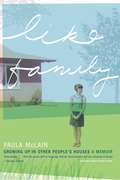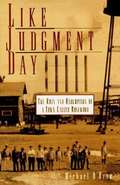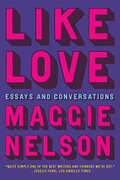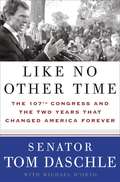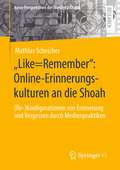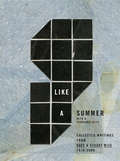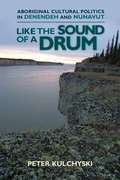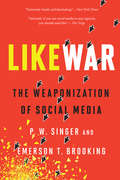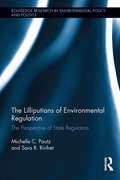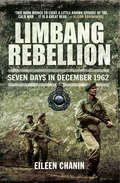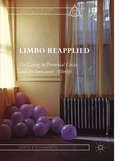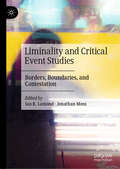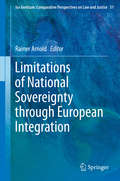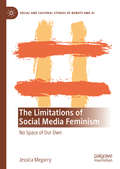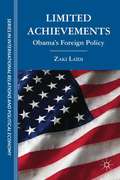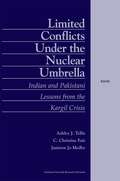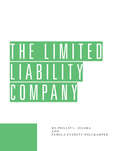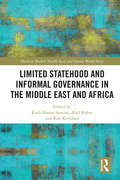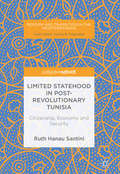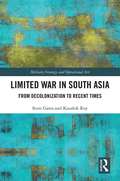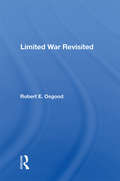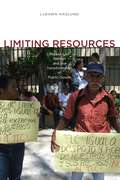- Table View
- List View
Like Family: Growing up in Other People's Houses
by Paula MclainIn the tradition of Jo Ann Beard's Boys of My Youth, and Mary Karr's The Liar's Club, Paula McLain has written a powerful and haunting memoir about the years she and her two sisters spent as foster children. In the early 70s, after being abandoned by both parents, the girls were made wards of the Fresno County, California court and spent the next 14 years-in a series of adoptive homes. The dislocations, confusions, and odd pleasures of an unrooted life form the basis of one of the freshest memoirs to be published in recent years. McLain's beautiful writing and limber voice capture the intense loneliness, sadness, and determination of a young girl both on her own and responsible, with her siblings, for staying together as a family.
Like Judgment Day: The Ruin and Redemption of a Town Called Rosewood
by Michael D'OrsoThe 1923 destruction of the town of Rosewood, Florida, is a shocking episode in the history of American race relations. In a week of terror that followed the alleged rape of a white woman, at least six residents of the mostly black town were murdered. The terrified survivors were chased into the swamps, and their houses, churches, and stores burned. For over 60 years, the former citizens of Rosewood lived quietly with their grief and fear. Finally, through the determined efforts of Rosewood descendants, persistent journalists, and talented lawyers, the long-buried story was brought to light.
Like Love: Essays And Conversations
by Maggie NelsonOne of the Globe and Mail's most anticipated books of 2024A career-spanning collection of inspiring, revelrous essays about art and artists.Like Love is a momentous, raucous collection of essays drawn from twenty years of Maggie Nelson&’s brilliant work. These profiles, reviews, remembrances, tributes, and critical essays, as well as several conversations with friends and idols, bring to life Nelson&’s passion for dialogue and dissent. The range of subjects is wide—from Prince to Carolee Schneemann to Matthew Barney to Lhasa de Sela to Kara Walker—but certain themes recur: intergenerational exchange; love and friendship; feminist and queer issues, especially as they shift over time; subversion, transgression, and perversity; the roles of the critic and of language in relation to visual and performance arts; forces that feed or impede certain bodies and creators; and the fruits and follies of a life spent devoted to making.Arranged chronologically, Like Love shows the writing, thinking, feeling, reading, looking, and conversing that occupied Nelson while writing iconic books such as Bluets and The Argonauts. As such, it is a portrait of a time, an anarchic party rich with wild guests, a window into Nelson&’s own development, and a testament to the profound sustenance offered by art and artists.
Like No Other Time
by Tom DaschleTom Daschle, the Majority Leader of the historic 107th Senate, presents a candid insider’s account of the workings of the U. S. government during two of the most tumultuous years in the nation’s history. The 107th Congress faced a time like no other in the life of the nation. This was the era of the first presidential election to be decided by the United States Supreme Court, the fifty-fifty Senate, the horror of September 11, the anthrax attacks on media and the government (including Daschle’s own office), the war on terrorism, corporate scandals that shook the economy, the inexorable move toward war with Iraq, and other dramatic events, all leading up to the historic midterm elections of 2002. Through it all, Senator Tom Daschle had, with the exception of the President, the most privileged view of these unfolding developments, both in front of and behind the closed doors of government. In Like No Other Time, Daschle offers a riveting account of his singular perspective on a time when the nation faced deadly and elusive external enemies and a level of domestic political contention rarely seen in American history. Senator Daschle is un-flinching in his impressions of the key political figures of our time from both parties. The result is an acutely perceptive assessment of how our government met—and sometimes did not meet—the challenges of a remarkable era. As it was during the years of the 107th Congress, the United States is once again at a critical and historic crossroads. Our choices, based on what we have learned from our recent past, will affect our future in profound ways. For Senator Daschle, the first and perhaps most important choice lies with what kind of representation and leadership we want in government. It is a choice between a political party with a core philosophical belief in the power of our collective will to confront these challenges through our government, and one dominated by a group of people who don’t like and don’t believe in government. From the Hardcover edition.
„Like=Remember“: (Re-)Konfigurationen von Erinnerung und Vergessen durch Medienpraktiken (Neue Perspektiven der Medienästhetik)
by Mathias ScheicherIn diesem Band wird systematisch und theoretisch angeleitet die alltägliche, gesellschaftliche Weitergabe von Wissen über die Shoah durch digitale Praktiken untersucht. Diese stellen die Grundlage für ein innovatives Analysemodell von Online-Erinnerungskulturen dar, das entlang populärer und medienkünstlerischer Beispiele entwickelt wird. Dabei werden Fragen nach nor-mativen Aushandlungen, Formen von Zeugenschaft sowie transnationale digitale Handlungs-routinen aus einer medienwissenschaftlichen Perspektive unter dem Begriff der (Re-)Konfigurationen neu zusammengefasst.
Like A Summer With A Thousand Julys
by Dave Wise Stuart WiseNow into their late 60's, and still working the buildings with the same London gang they've been with since the late 70's, key King Mob faces Dave and Stuart Wise have never stopped writing and agitating, and this, a companion volume to last years' warmly received 'King Mob: A Critical Hidden History', pulls together polemics, reflections, and righteous rants from the last 30 years. Opening up with 'Like A Summer With A 1000 July's' extensive, sideways look at the wave of urban insurrection that swept inner city UK in 1981; debunking punk's 'situationist myth' in 'The End Of Music', and a brief, but definitive look at the glorious 'King Mob/Father Xmas at Selfridges' prank of 1968. 'Nietzsche: Revolutionary' looks at the much revered/contested philosopher as "a reluctant communist", "proto ecologist" and "brother Hegelian. Separate chapters look back with affection and honesty at old friends, comrades and English Situationist founders Ralph Rumney and Alexander Trocchi respectively. Along the way, shards of surrealism cut through: the assault on art "in the great mod battle of Keswick", when "a travelling theatre was again torched," or the Dadaist guerrilla flavoured August '81 bank holiday attack when "the model railway station at Brighton was molotoved by white youths." And whilst an unwavering ideological perspective firmly rejects the stasis of the post war 'revolutionary left', just as it recoils in disgust at encroaching Neo Liberal barbarism, Dave Wise never shies away from reflecting on the personal, via the prism of the political : "Guy and Michele broke up around 1970.....everybody's relationship did, including my own; a break up...I never got over, and I've thought about my beloved Anne Ryder every day of my life since. These break-ups weren't about sexual difficulties or inadequacies nor about not being able to relate or even love, but finally about history and how the most profound revolt ever experienced failed so utterly, and the essential by-product of such failure was a psychosomatic pain so desperate it seemed in need of therapeutic treatment; a treatment simple warm cuddling and quiet affection couldn't match. We stormed and smashed open the gates of paradise to let in every exploited nutter who cared to join in... yet on the brink of utopia we were refused entry and where, just where, could you go from such a point of no return?"
Like the Sound of a Drum: Aboriginal Cultural Politics in Denendeh and Nunavut
by Peter KulchyskiPart ethnography, part narrative, Like the Sound of a Drum is evocative, confrontational, and poetic. For many years, Peter Kulchyski has travelled to the north, where he has sat in on community meetings, interviewed elders and Aboriginal politicians, and participated in daily life. In Like the Sound of a Drum he looks as three northern communities — Fort Simpson and Fort Good Hope in Denendeh and Pangnirtung in Nunavut — and their strategies for maintaining their political and cultural independence. In the face of overwhelming odds, communities such as these have shown remarkable resources for creative resistance. In the process, they are changing the concept of democracy as it is practised in Canada.
LikeWar: The Weaponization of Social Media
by P. W. Singer Emerson T. BrookingTwo defense experts explore the collision of war, politics, and social media, where the most important battles are now only a click away. Through the weaponization of social media, the internet is changing war and politics, just as war and politics are changing the internet. <P><P>Terrorists livestream their attacks, “Twitter wars” produce real‑world casualties, and viral misinformation alters not just the result of battles, but the very fate of nations. The result is that war, tech, and politics have blurred into a new kind of battlespace that plays out on our smartphones. <P><P>P. W. Singer and Emerson Brooking tackle the mind‑bending questions that arise when war goes online and the online world goes to war. They explore how ISIS copies the Instagram tactics of Taylor Swift, a former World of Warcraft addict foils war crimes thousands of miles away, internet trolls shape elections, and China uses a smartphone app to police the thoughts of 1.4 billion citizens. <P><P>What can be kept secret in a world of networks? Does social media expose the truth or bury it? And what role do ordinary people now play in international conflicts? <P><P>Delving into the web’s darkest corners, we meet the unexpected warriors of social media, such as the rapper turned jihadist PR czar and the Russian hipsters who wage unceasing infowars against the West. Finally, looking to the crucial years ahead, LikeWar outlines a radical new paradigm for understanding and defending against the unprecedented threats of our networked world.
Lilibet: An Intimate Portrait of Elizabeth II
by Carolly EricksonWith her customary psychological insight, historian Erickson traces the queen's gilded but often thorny path from her overprotected girlhood to her ascension to the throne at twenty-five to her personal and national difficulties as queen.
The Lilliputians of Environmental Regulation: The Perspective of State Regulators (Routledge Research in Environmental Policy and Politics)
by Michelle C. Pautz Sara RinfretWhen we think about environmental policy and regulation in the U.S., our attention invariably falls on the federal level and, more specifically, the U.S. Environmental Protection Agency. Although such a focus is understandable, it neglects the actors most responsible for the implementation and maintenance of the nation's environmental laws - the states. Recognition of the importance of the states still ignores an even smaller subsection of actors, inspectors. These front-line actors in state environmental agencies are the individuals responsible for writing environmental rules and ensuring compliance with those rules. They play an important role in the environmental regulatory state. With data collected from more than 1,200 inspectors across 17 states, Michelle C. Pautz and Sara R. Rinfret take a closer look at these neglected actors to better understand how environmental regulators perceive the regulated community and how they characterize their interactions with them. In doing so, they explore the role these front-line actors play, what it is like to be them, what they think of their place in the environmental regulatory system, and how they interact with the regulated community. An original, timely and unmatched volume advancing the debate on the future of environmental regulation in the U.S.
Limbang Rebellion: Seven Days in December 1962
by Eileen ChaninIn early December 1962 there was a surprise rebel uprising in northern Borneo. The leader of the anti-colonialist North Kalimantan National Army, Sheikh Azahari, mounted the insurrection that became known as the Brunei Revolt. It aimed to thwart Britain and Malaya's plan to combine the British territories of Borneo into a new Federation of Malaysia.The river town of Limbang, an administrative centre in the British colony of Sarawak, became the pivot of the rebellion that was to be the opening act of the military and diplomatic conflict known as 'Konfrontasi'.Combining eyewitness accounts with thorough research, Limbang Rebellion reveals what it was like to be thrown into this intense and unexpected conflict in which hostages were taken and threatened with execution. It describes the involvement of the Royal Marines under Captain Jeremy Moore, MC, and the daring rescue mission he led under challenging circumstances, which included being vastly outnumbered by the rebel forces. The result is a gripping account of seven dramatic days when a small town in northern Borneo suddenly seized the world's attention.
Limbo Reapplied: On Living in Perennial Crisis and the Immanent Afterlife (Radical Theologies and Philosophies)
by Kristof K.P. VanhoutteThe observation that our world is signed by a lasting crisis is as much underwritten as it is questioned. This book offers a new and provocative thesis by taking recourse to the religious discourse of Limbo, and by investigating the temporal and spatial structures of crisis and modernity. Modernity reveals itself to be the state of perennial crisis, and we all live in an immanentized state of Limbo.
Liminality and Critical Event Studies: Borders, Boundaries, and Contestation
by Ian R. Lamond Jonathan MossThis book explores and challenges the concept and experience of liminality as applied to critical perspectives in the study of events. It will be of interest to researchers in event studies, social and discursive psychology, cultural and political sociology, and social movement studies. In addition, it will provide interested general readers with new ways of thinking and reflecting on events. Contributing authors undertake a discussion of the borders, boundaries, and areas of contestation between the established social anthropological concept of liminality and the emerging field of critical event studies. By drawing these two perspectives closer together, the collection considers tensions and resonances between them, and uses those connections to enhance our understanding of both cultural and sporting events and offer fresh insight into events of activism, protest, and dissent.
Limitarianism: The Case Against Extreme Wealth
by Ingrid Robeyns"A powerful case for limitarianism—the idea that we should set a maximum on how much resources one individual can appropriate. A must-read!" —Thomas Piketty, bestselling author of Capital in the Twenty-First CenturyAn original, bold, and convincing argument for a cap on wealth by the philosopher who coined the term "limitarianism."How much money is too much? Is it ethical, and democratic, for an individual to amass a limitless amount of wealth, and then spend it however they choose? Many of us feel that the answer to that is no—but what can we do about it?Ingrid Robeyns has long written and argued for the principle she calls "limitarianism"—or the need to limit extreme wealth. This idea is gaining momentum in the mainstream – with calls to "tax the rich" and slogans like "every billionaire is a policy failure"—but what does it mean in practice?Robeyns explains the key reasons to support the case against extreme wealth: It keeps the poor poor and inequalities growingIt&’s often dirty moneyIt undermines democracyIt&’s one of the leading causes of climate changeNobody actually deserves to be a millionaireThere are better things to do with excess moneyThe rich will benefit, tooThis will be the first authoritative trade book to unpack the concept of a cap on wealth, where to draw the line, how to collect the excess and what to do with the money. In the process, Robeyns will ignite an urgent debate about wealth, one that calls into question the very forces we live by (capitalism and neoliberalism) and invites us to a radical reimagining of our world.
Limitations of National Sovereignty through European Integration
by Rainer ArnoldThe book considers the changes which national sovereignty has undergone through the supranational European integration. In various contributions by renowned academics and high judges demonstrate the serious impacts of supranationality on the EU member states and even on third countries which are connected with the EU by international treaties. It becomes clear that primacy of EU law, the most significant expression of supra-nationality, collides with national sovereignty as anchored in the national constitutions. The studies clearly show that most member states do not fully deny EU law primacy but are aware of the need to find an adequate balance between the supranational and the national orders. The result from the analyses of the authors from various European countries is that the upcoming constitutional paradigm is "constitutional identity", a concept established by jurisprudence in Germany, France, Czech Republic (without being named so) and debated also in Poland which, herself, denies supranational impact on the national Constitution entirely. Studies on selected EU member states clarify the specific national approaches towards the limitations of their sovereignty as developed by the constitutional jurisprudence (Poland, Czech Republic, Hungary, Romania, Italy, Germany with comparative references to United Kingdom and France). It is illuminated that traditionally strong sovereignty concepts (UK, France) are considerably relativized and functionally opened towards the integration challenges. Basic issues are furthermore reflected, such as the supranational impact on the State's power to reform its Constitution, the relation of national and constitutional identity and the national and supranational perspectives of identity. The book also includes Europe beyond the EU by research on the supranational character of association treaties (from a Ukrainian perspective) and on the Europeanization of a third country preparing EU membership (Albania).
The Limitations of Social Media Feminism: No Space of Our Own (Social and Cultural Studies of Robots and AI)
by Jessica Megarry#MeToo. Digital networking. Facebook groups. Social media continues to be positioned by social movement scholars as an exciting new tool that has propelled feminism into a dynamic fourth wave of the movement. But how does male power play out on social media, and what is the political significance of women using male-controlled and algorithmically curated platforms for feminism? To answer these questions, Megarry foregrounds an analysis of the practices and ethics of the historical Women’s Liberation Movement (WLM), including the revolutionary characteristics of face-to-face organising and the development of an autonomous print culture. Centering discussions of time, space and surveillance, she utilises radical and lesbian feminist theory to expose the contradictions between the political project of women’s liberation and the dominant celebratory narratives of Web 2.0. This is the first book to seriously consider how social media perpetuates the enduring logic of patriarchy and howdigital activism shapes women’s oppression in the 21st century. Drawing on interviews with intergenerational feminist activists from the UK, the USA, Australia, Canada and New Zealand, as well as archival and digital activist materials, Megarry boldly concludes that feminists should abandon social media and return to the transformative powers of older forms of women-centred political praxis. This book will be of interest to scholars and students of Women’s and Gender Studies, Lesbian and Queer Studies, Social Movement Studies, Critical Internet Studies and Political Communication, as well as anyone with an interest in feminist activism and the history of the WLM.
Limited Achievements: Obama’s Foreign Policy (The Sciences Po Series in International Relations and Political Economy)
by Zaki LaïdiThrough an analysis of the general principles of Obama's foreign policy, LaIdi shows how Obama has charted a realist course in the Middle East, in Europe, in diplomacy, and in war.
Limited Conflicts Under the Nuclear Umbrella: Indian and Pakistani Lessons from the Kargil Crisis
by Jamison Jo Medby Ashley J. Tellis C. Christine FairThis report examines the views of India and Pakistan on the significance of Pakistan's foray into the Kargil-Dras sector in a limited war that has come to be known as the Kargil conflict. The goal of the analysis is to assess both combatants' perceptions of the crisis, with a view to evaluating the possibilities of future Kargil-like events and the implications of the lessons each country learned for stability in South Asia. The analysis is based almost exclusively on Indian and Pakistani source materials. The Kargil crisis demonstrated that even the presence of nuclear weapons might not appreciably dampen security competition between the region's largest states. However, the question remains of whether or not the Kargil war represents a foretaste of future episodes of attempted nuclear coercion if India and Pakistan believe that their nuclear capabilities provide them the immunity required to prosecute a range of military operations short of all-out war.
The Limited Liability Company
by Pamela Nollkamper Phillip JelsmaLLC Forms and Answers For guidance on efficiently forming and expertly advising LLCs, turn to James L. Leet, James Clarke, and Pamela Nollkamper's The Limited Liability Company. You will find the book and free Digital Access filled with practical advice, hundreds of reproducible forms, tax consideration, state-by-state analysis, and more: Forms * Pre-formation checklists; mandatory state articles of organization, with alternative provisions; state default rules; sample operating agreements, with opt-in features checklist and drafting outline; buy-sell agreements * Procedures and issues * Mandated articles of organization; filing procedures; all statutory requirements; and more... Now you can efficiently form LLCs custom-tailored to a variety of purposes, and provide quick answers to a wide range of client LLC questions with The Limited Liability Company. The Limited Liability Company provides complete materials for every state - all statutory requirements and forms: * Content permitted in articles of organization and operating agreements * Name reservation, filing and other formation procedures and fees Drafting checklists and digitized forms allow you to quickly create customized formation documents. Numerous alternative article provisions are also provided: management, committees, transfers, members, voting, notice, operating, arbitration, merger, share exchange, consolidation, and more. Also provided are model operating agreements and buy-sell agreements, both with alternate provisions and drafting outlines. Detailed Tax Guidance A comprehensive tax chapter addresses the most troublesome taxation issues you will encounter with LLCs. * Artful drafting can avoid many governance challenges, since many common LLC problems are both foreseeable and preventable. The Limited Liability Company provides drafting advice and alternate clauses to help avoid abuse by majority owners, operational deadlock, divorce of member, discharge of minority owners, unfair distribution of profits, withdrawal of members, mergers and acquisitions, and more. Key Issues and Procedures To help you traverse other difficult areas, The Limited Liability Company provides detailed discussions, step-by-step procedures, digitized forms, and citations to controlling authority. *
Limited Statehood and Informal Governance in the Middle East and Africa (Durham Modern Middle East and Islamic World Series)
by Ruth Hanau Santini Abel Polese Rob KevlihanHybrid forms of governance – where the central state authority does not possess a monopoly of violence and fails to exercise control – are not only an epiphenomena, but a reality likely to persist. This book explores this phenomenon drawing on examples from the Middle East and Africa. It considers the different sorts of actors – state and non-state, public and private, national and transnational – which possess power, examines the dynamics of the relationships between central authorities and other actors, and reviews the varying outcomes. The book provides an alternative view of the way in which governance has been constructed and lived, puts forward a conceptualisation of various forms of governance which have hitherto been regarded as exceptions, and argues for such forms of governance to be regarded as part of the norm.
Limited Statehood in Post-Revolutionary Tunisia: Citizenship, Economy And Security (Reform and Transition in the Mediterranean)
by Ruth Hanau SantiniThis book explores the complexity of the only widely-acclaimed successful democratic transition following the Arab uprisings of 2010-2011 – the Tunisian one. The country’s transformation, in terms of state-society relations across several analytical dimensions (citizenship, security, political economy, external relations), is looked at through the prism of statehood and of limited statehood in particular. The author illustrates how the balance of power and the relationship between the state and societal forces have been shaped and reshaped a number of times at key critical junctures by drawing on examples from very different policy arenas. The critical reading of statehood speaks beyond the Tunisian case study as notions of limited statehood can be applied, with different degrees of intensity and in some dimensions more than others, to most political systems in the Middle East and North Africa. Accessible for students, academics and professionals alike, the book illuminates the complexities and challenges of a successful, albeit still fragile, transition.
Limited War in South Asia: From Decolonization to Recent Times (Military Strategy and Operational Art)
by Scott Gates Kaushik RoyThis book examines the origins, courses and consequences of conventional wars in post-colonial South Asia. Although South Asia has experienced large-scale conventional warfare on several occasions since the end of World War II, there is an almost total neglect of analysis of conventional warfare in the Indian subcontinent. Focusing on China, India and Pakistan, this volume, therefore, takes a unique approach. Regional rivalries between India and Pakistan are linked with global rivalries between the US and USSR (later Russia) and then China, and war is defined in a broader perspective. The book analyses the conduct of land, sea and air warfare, as well as the causes and consequences of conflicts. Tactical conduct of warfare (the nature of mobile armoured strikes and static linear infantry combat supported by heavy artillery) and generalship are studied along with military strategy, doctrine and grand strategy (national security policy), which is an amalgam of diplomacy, military strategy and economic policy. While following a realpolitik approach, this book blends the development of military strategies and doctrines with the religious and cultural ethos of the subcontinent’s inhabitants. Drawing on sources not easily accessible to Western scholars, the overall argument put forward by this work is that conventional warfare has been limited in South Asia from the very beginning for reasons both cultural and realpolitik. This book will be of much interest to students of South Asian politics, security studies, war and conflict studies, military studies and International Relations in general.
Limited War Revisited
by Robert E. OsgoodThe strategy of limited war has transformed the American approach to the use of force and played a key role in U.S. foreign policy since World War II. As the mainstay of containment it was designed to deter and fight wars effectively at a tolerable cost and risk in the nuclear age by providing the United States with a flexible and controlled response to a variety of military threats. The strategy met a severe challenge in the Vietnam war; it has nevertheless continued to prevail as a doctrine, if not necessarily with its former utility, by adapting to the changing domestic and international environment after Vietnam. Robert E. Osgood critically examines the success, ambiguities, and flaws of the strategy in its expanding application to postwar military policy. He interprets its impact on the Vietnam war and vice versa, extends his analysis to the new challenges posed by changes in technology and the military balance that affect U.S. security, and concludes with a searching inquiry into the problems of limited war where its utility as an instrument of foreign policy is now most in doubt: the Third World.
Límites Socioculturales de la Educación Ambiental (Acercamiento desde la experiencia cubana)
by Carlos Jesús Delgado DíazEs evidente que el progreso científico-tecnológico, el bienestar de las sociedades industrializadas y el deterioro del medio ambiente se encuentran profundamente relacionadas. Al minarse las bases de los ciudadanos, la preocupación social por lo ambiental se ha manifestado como una institución social de ese vínculo con la naturaleza demandando una nueva educación que incluya la reflexión y modificación de su relación material con el mundo.
Limiting Resources: Market-Led Reform and the Transformation of Public Goods (G - Reference, Information and Interdisciplinary Subjects)
by LaDawn HaglundThe provision of public goods such as education, electricity, health, sanitation, and water used to be regarded as primarily the responsibility of governments, but in the 1980s privatization of such services spread and reliance on market mechanisms instead of governments became common in many parts of the world, including developing countries. The record of the past twenty-five years of market-led development, however, has not been encouraging. Not only has it failed to improve public services significantly, but it has also undermined democratic institutions and processes, reproduced authoritarian relations of power, and suppressed alternatives made possible by an increasing global acceptance of the importance of economic and social rights. In Limiting Resources, LaDawn Haglund seeks an understanding of public goods that can better serve the needs of people in developing countries today.Haglund critiques the narrow conception of public goods used in economics, which tends to limit the range of resources considered “public,” and proposes an expanded conception drawing from multiple disciplines that incorporates issues of justice, inclusion, and sustainability. She then uses case studies of electricity and water provision in Central America to illuminate the conditions for success and the causes of failure in constructing adequate mechanisms for the supply of public goods. She follows with an analysis of political conflicts over privatization that reveals how neoliberal policies have made effective state action difficult. The book concludes with suggestions for ways in which this reformulated conception of public goods can be applied to promote justice, sustainability, and economic and social rights in developing countries.
